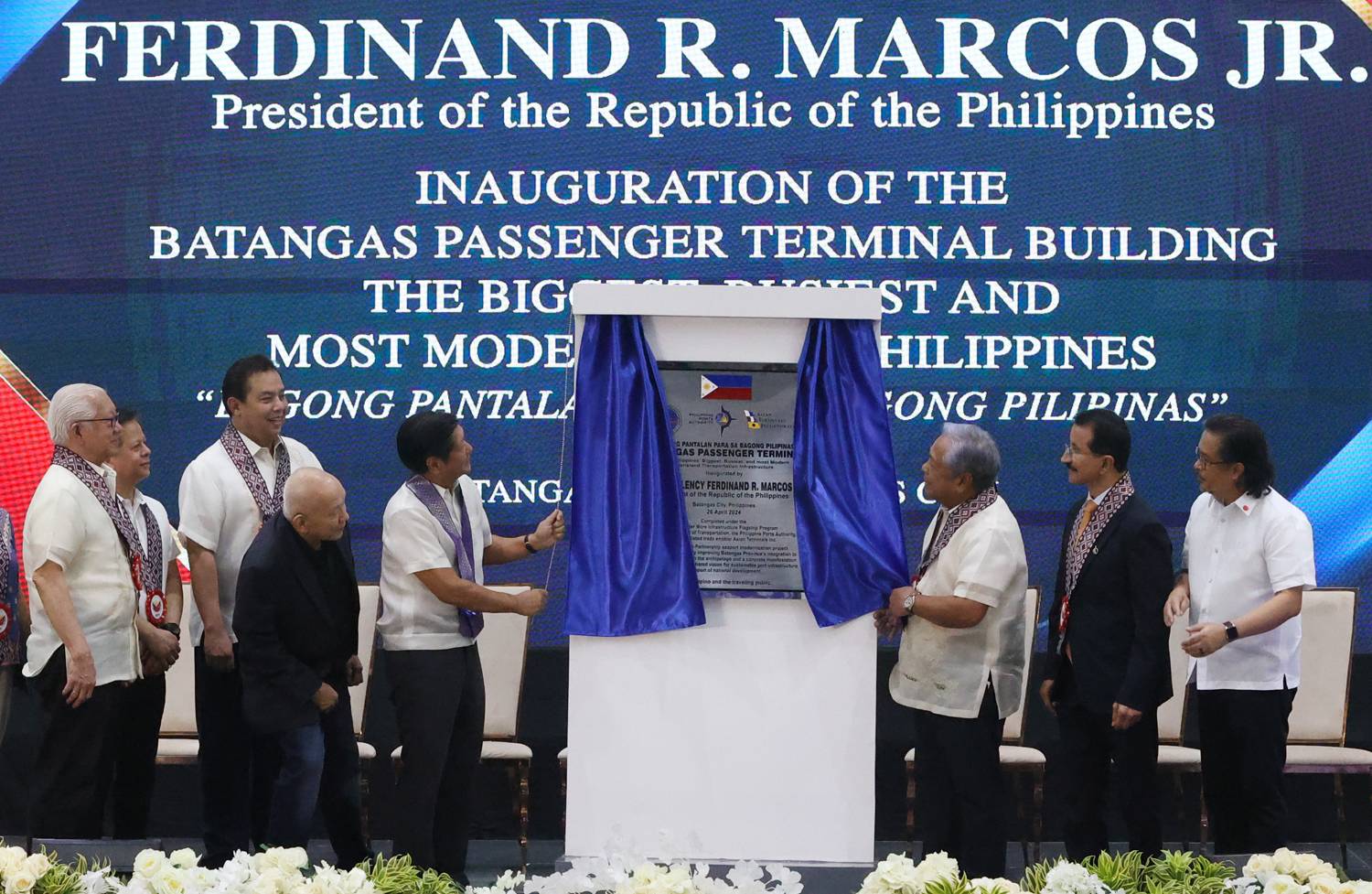Marcos launches Port of Batangas expansion project

‘OPPORTUNITY FOR PROGRESS’ President Ferdinand Marcos Jr. on Friday leads the unveiling of the marker of the passenger terminal and docking area of the Port of Batangas. The upgraded terminal is the first phase of the port’s expansion project. —PHOTO BY NIÑO JESUS ORBETA
BATANGAS CITY — Highlighting its role as a port of national significance that handles large volumes of trade and passengers, President Ferdinand Marcos Jr. on Friday pushed for the continued expansion of the Port of Batangas as a crucial phase in the country’s economic transformation.
The President cited the “multiple strategic roles” of the Batangas port in agriculture, tourism and trade not just for the Calabarzon region (Cavite, Laguna, Batangas, Rizal and Quezon) but for the entire Philippines, as he inaugurated the new Batangas Port Passenger Terminal Building here on Friday afternoon.
READ: Marcos cites key economic role of upgraded Batangas Port
“With the large volume of trade and passengers that it handles, the Port of Batangas is so crucial that economic planners have underscored the importance of the continuous expansion of this major transportation hub to support the country’s economic transformation,” Marcos said.
He described the Port of Batangas as a “gateway to the nation’s dynamic capital region, a portal to agricultural powerhouses, an access point to island tourism paradises, and a receiver of goods that fill and fuel the vibrancy of our economy.”
“True enough, maximizing the Port of Batangas helps in decongesting our Manila ports, causing the dispersal of economic activities to places more than capable of housing entrepreneurial and industrial boom,” the President said.
He added: “Nothing surpasses its success in connecting people, from distant islands and diverse cultures, bringing them together in fruitful and enjoyable interaction that strengthens the national bond and the unity of Filipinos.”
Upgraded terminal
The President was given a tour of the upgraded Batangas Port Passenger Terminal Building, which officials of the Philippine Ports Authority touted as the “biggest, busiest and most modern” passenger terminal building in the country.
The Port of Batangas is operated by Asian Terminal Inc. and connects mainland Luzon to Mindoro, Marinduque, Romblon and Palawan, as well as Iloilo, Negros, Cebu and Mindanao through fast crafts, ferries and roll-on/roll-off ships.
READ: Marcos asked to stop Batangas reclamation too
Complete with food concessionaires, shops, fully air-conditioned lounges, facilities for the elderly and persons with disabilities and a prayer room, the 1.5-hectare terminal can now accommodate up to 8,000 passengers at a time—an improvement from its previous 2,500 passenger capacity.
The President said this will bring annual passenger capacity from 4 million to 12.8 million passengers.
The construction for the upgrade began in 2021 and was completed by the first quarter of 2024, at a cost of P 1.3 billion. The building also featured multilevel car storage facilities that can accommodate 13,000 vehicles.
‘Unlock the potential’
“Today, we are inaugurating the bigger and the better passenger terminal to fully unlock the potential of the places and the people that this port serves. In so doing, we validate its status, not as a provincial port, but as a port of national significance,” Marcos said.
He added that the expansion of the port’s facilities is not only “a reaffirmation of the importance of this Port of Batangas, but as a vote of confidence in the promising and positive future of the entire Calabarzon, Mimaropa (Mindoro Occidental, Mindoro Oriental, Marinduque, Romblon and Palawan)and Bicol regions.”
The President also touted the Passenger Terminal Building’s features, which were “designed and built with the passenger’s comfort in mind.”
“Today, we launch a project that will not only open a state-of-the-art facility but also open a great opportunity for the progress of every Filipino. I am sure that it will not just ensure a pleasant voyage, but it will encourage more to travel because of modern facilities like these,” Marcos said.